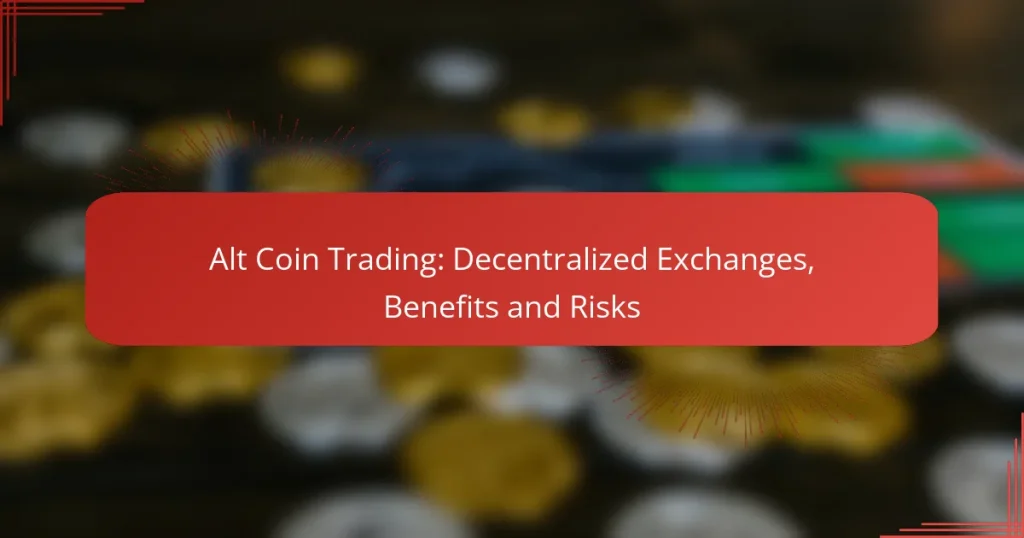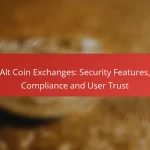Alt coin trading on decentralized exchanges (DEXs) has gained popularity due to the direct peer-to-peer transactions they facilitate, eliminating the need for intermediaries. While DEXs offer benefits such as enhanced privacy, lower fees, and a wider selection of cryptocurrencies, traders must also navigate risks like smart contract vulnerabilities and market volatility. Understanding both the advantages and challenges of DEXs is essential for making informed trading decisions.
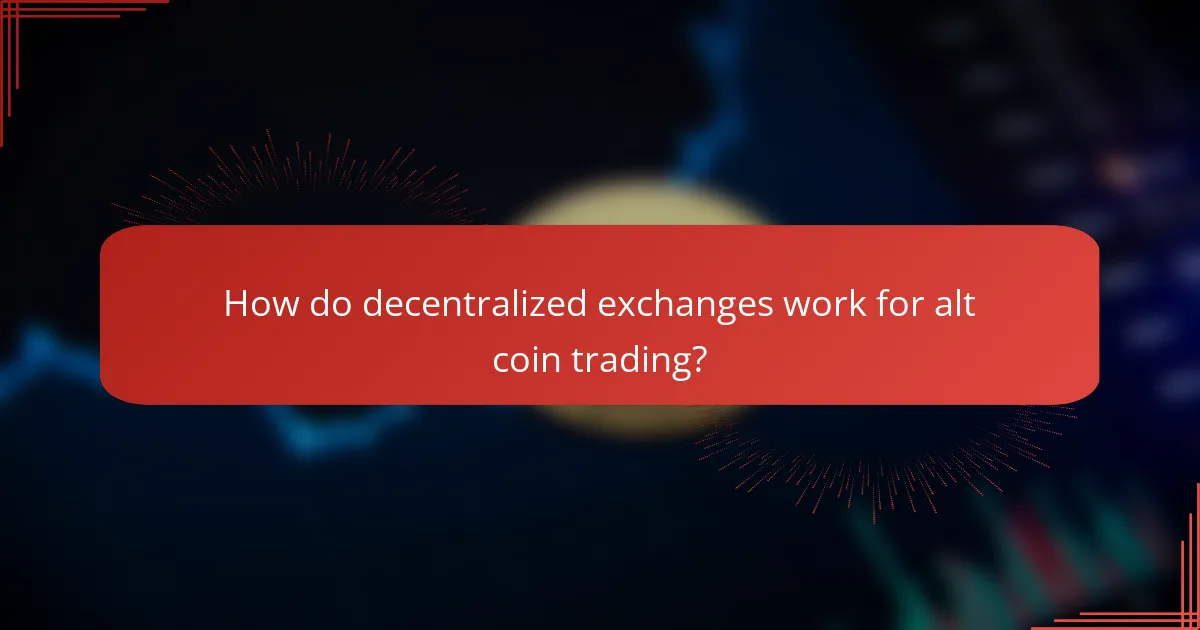
How do decentralized exchanges work for alt coin trading?
Decentralized exchanges (DEXs) facilitate alt coin trading by allowing users to trade directly with one another without intermediaries. These platforms rely on blockchain technology to ensure secure and transparent transactions, enabling users to maintain control over their funds.
Peer-to-peer trading mechanisms
Peer-to-peer trading mechanisms enable users to connect and trade directly with one another on decentralized exchanges. This eliminates the need for a central authority, reducing fees and increasing privacy. Users can place buy and sell orders, and the DEX matches these orders based on price and availability.
For example, if a user wants to buy an alt coin at a specific price, they can create an order that remains open until another user matches it. This system fosters a more democratic trading environment, as users set their own prices rather than relying on a centralized market maker.
Smart contract utilization
Smart contracts are self-executing contracts with the terms of the agreement directly written into code. In decentralized exchanges, smart contracts automate the trading process, ensuring that trades are executed only when specific conditions are met. This minimizes the risk of fraud and enhances security.
For instance, when a trade is initiated, the smart contract holds the assets in escrow until both parties fulfill their obligations. Once conditions are satisfied, the contract automatically executes the trade, transferring assets securely and efficiently.
Liquidity pools and market making
Liquidity pools are collections of funds locked in a smart contract that facilitate trading on decentralized exchanges. Users can contribute to these pools by depositing their alt coins, which helps ensure that there is enough liquidity for trades to occur smoothly. In return, liquidity providers earn fees from trades executed within the pool.
Market making on DEXs involves providing liquidity to the market by placing buy and sell orders. This practice helps stabilize prices and reduces slippage, benefiting traders by allowing them to execute larger orders without significant price impact. However, liquidity providers should be aware of impermanent loss, which can occur when the value of their deposited assets fluctuates compared to holding them outright.
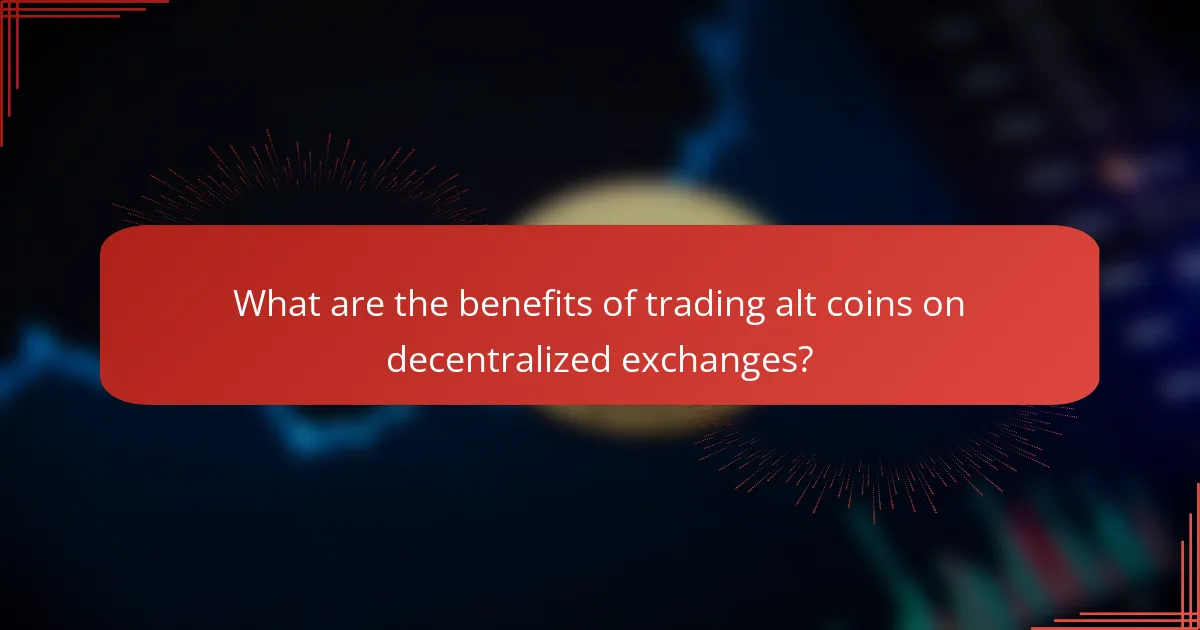
What are the benefits of trading alt coins on decentralized exchanges?
Trading alt coins on decentralized exchanges (DEXs) offers several advantages, including enhanced privacy, lower fees, and access to a broader selection of cryptocurrencies. These benefits make DEXs an appealing option for traders seeking more control over their transactions and investments.
Enhanced privacy and security
Decentralized exchanges prioritize user privacy by allowing trades without requiring personal information. This anonymity reduces the risk of data breaches and identity theft, which are concerns on centralized platforms.
Moreover, DEXs operate on blockchain technology, which enhances security through decentralized ledgers. Users maintain control of their private keys, minimizing the risk of hacks that often target centralized exchanges.
Lower trading fees compared to centralized exchanges
Trading fees on decentralized exchanges are generally lower than those on centralized platforms. DEXs often charge minimal fees for transactions, typically ranging from 0.1% to 1%, compared to centralized exchanges that may impose higher fees plus withdrawal charges.
This cost-effectiveness can significantly benefit frequent traders, allowing them to maximize their profits by minimizing expenses associated with each trade.
Access to a wider range of alt coins
Decentralized exchanges provide access to a broader array of alt coins, including newly launched tokens that may not be available on centralized platforms. This variety allows traders to explore emerging projects and diversify their portfolios.
Many DEXs support trading pairs that are not listed elsewhere, enabling users to engage in niche markets and capitalize on unique investment opportunities. However, traders should conduct thorough research on these lesser-known coins to assess their viability and risks.
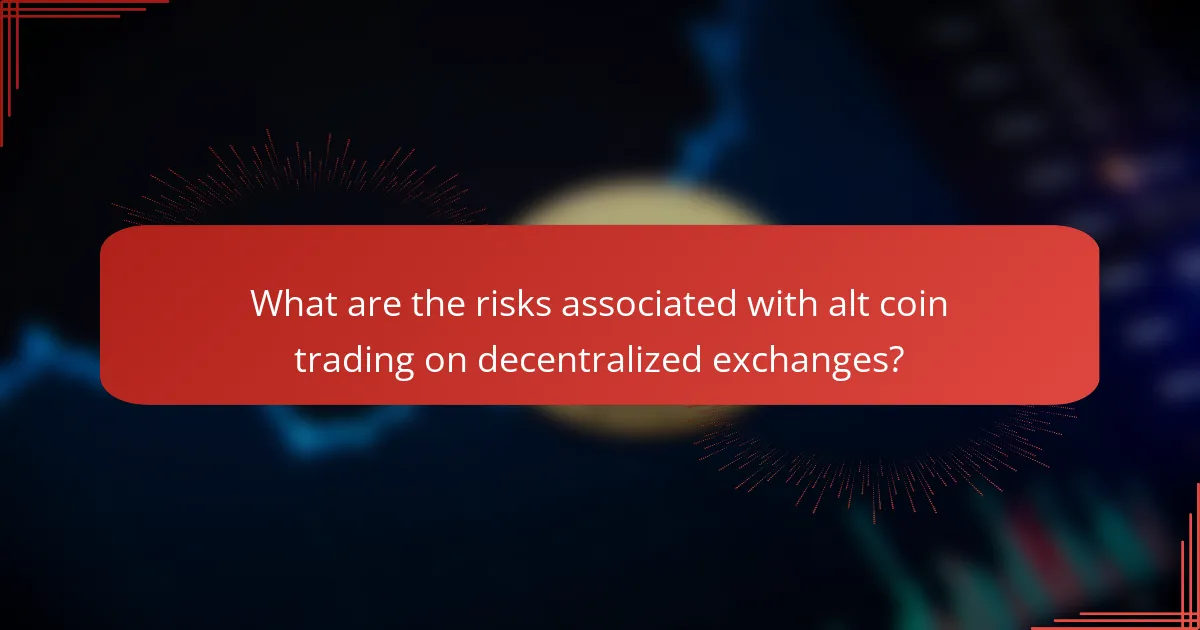
What are the risks associated with alt coin trading on decentralized exchanges?
Alt coin trading on decentralized exchanges (DEXs) carries several risks that traders should be aware of, including smart contract vulnerabilities, lack of regulatory oversight, and market volatility. Understanding these risks can help traders make informed decisions and protect their investments.
Smart contract vulnerabilities
Smart contracts are self-executing contracts with the terms directly written into code. While they enable trustless transactions, they can contain bugs or vulnerabilities that hackers may exploit. For example, poorly audited contracts can lead to significant financial losses, sometimes amounting to millions of dollars.
To mitigate these risks, traders should only use DEXs with well-reviewed smart contracts and consider platforms that have undergone extensive security audits. Regularly checking for updates and community feedback can also provide insights into the safety of a particular DEX.
Lack of regulatory oversight
Decentralized exchanges operate outside traditional financial regulations, which can pose risks for traders. Without regulatory bodies overseeing transactions, there is a higher chance of fraud, scams, and market manipulation. This lack of oversight can lead to uncertainty regarding the legality and security of trading practices.
Traders should exercise caution and conduct thorough research before engaging with a DEX. Familiarizing oneself with the exchange’s reputation and user reviews can help identify potential red flags. Additionally, understanding the legal landscape in one’s country regarding cryptocurrency trading is crucial.
Market volatility and liquidity issues
Alt coins are often more volatile than established cryptocurrencies like Bitcoin or Ethereum, leading to rapid price fluctuations. This volatility can result in significant gains but also substantial losses. Furthermore, many alt coins may suffer from low liquidity, making it difficult to execute trades without impacting the market price.
Traders should be prepared for sudden price changes and consider using limit orders to manage their trades more effectively. It’s advisable to trade alt coins with higher liquidity to minimize slippage and ensure smoother transactions. Keeping an eye on market trends and news can also help anticipate potential volatility spikes.
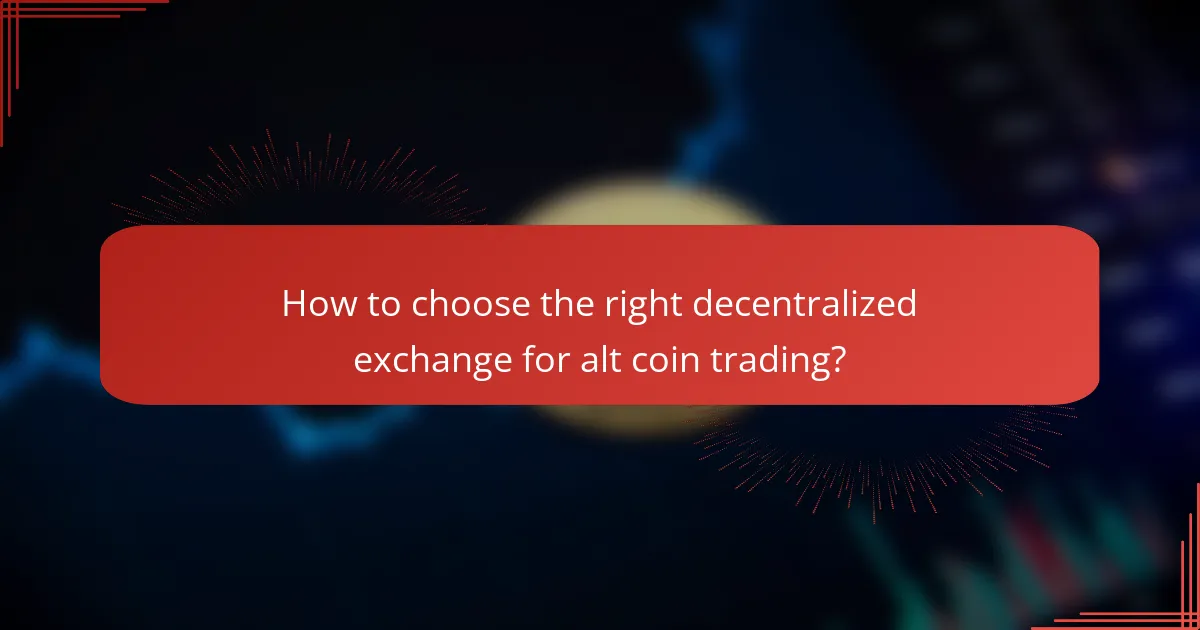
How to choose the right decentralized exchange for alt coin trading?
Choosing the right decentralized exchange (DEX) for alt coin trading involves assessing several key factors, including reputation, supported cryptocurrencies, and security measures. A well-selected DEX can enhance your trading experience and minimize risks.
Reputation and user reviews
The reputation of a decentralized exchange is crucial for ensuring reliability and trustworthiness. Look for platforms that have been in operation for a significant period and have positive user reviews across various forums and social media. Engaging with the community can provide insights into the exchange’s performance and reliability.
Check for any reported issues or controversies surrounding the DEX. A platform with a strong community presence and transparent communication is often a safer choice.
Supported alt coins and trading pairs
Different decentralized exchanges support varying numbers of alt coins and trading pairs. It’s essential to choose a DEX that offers the specific cryptocurrencies you wish to trade. Some exchanges focus on niche coins, while others provide a broader selection.
Consider using a DEX that allows for easy swapping between multiple alt coins without high fees. A diverse range of trading pairs can enhance your trading strategies and opportunities.
Security features and audits
Security is a top priority when selecting a decentralized exchange. Look for DEXs that implement robust security measures, such as multi-signature wallets, two-factor authentication, and regular security audits. These features help protect your assets from potential hacks or breaches.
Additionally, verify if the exchange has undergone third-party audits to assess its security protocols. A DEX that is transparent about its security practices is generally more trustworthy.
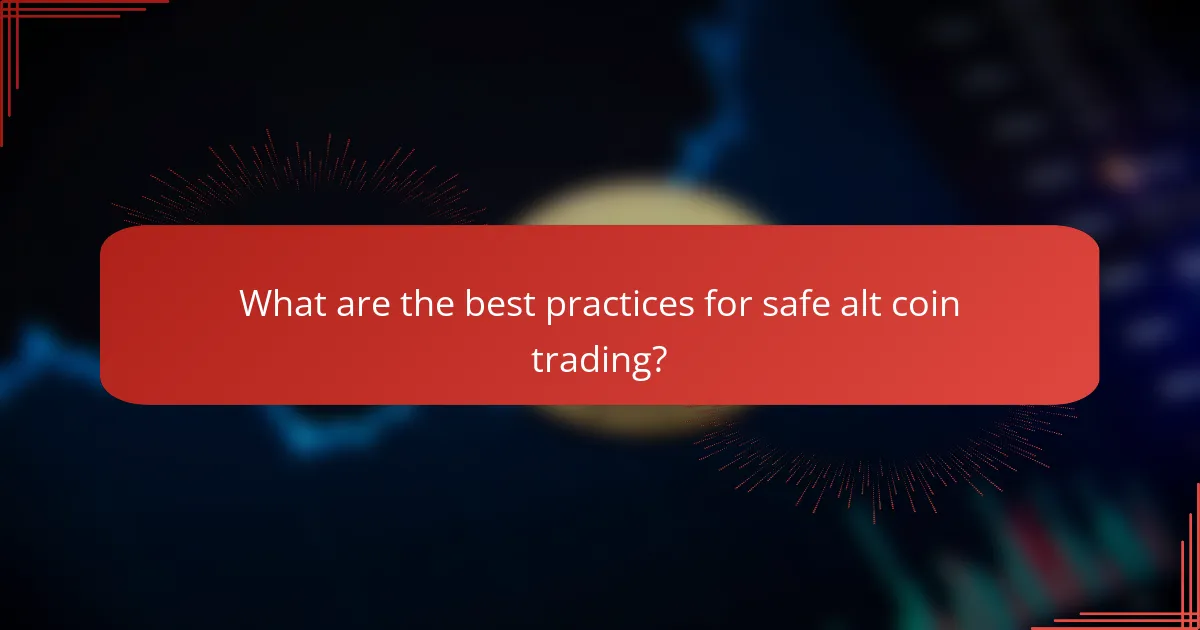
What are the best practices for safe alt coin trading?
To ensure safe alt coin trading, it is essential to implement security measures that protect your assets and personal information. Best practices include using hardware wallets for storage and enabling two-factor authentication on your accounts.
Using hardware wallets for storage
Hardware wallets are physical devices that securely store your alt coins offline, making them less vulnerable to hacking. Popular options include Ledger and Trezor, which support a wide range of cryptocurrencies.
When using a hardware wallet, always purchase directly from the manufacturer to avoid counterfeit products. Regularly update the wallet’s firmware to benefit from the latest security features.
Implementing two-factor authentication
Two-factor authentication (2FA) adds an extra layer of security to your trading accounts by requiring a second form of verification in addition to your password. This could be a code sent to your mobile device or generated by an authentication app.
To set up 2FA, choose a reliable app like Google Authenticator or Authy. Avoid using SMS for 2FA, as it can be intercepted. Regularly review your account activity for any unauthorized access and change your passwords frequently.
